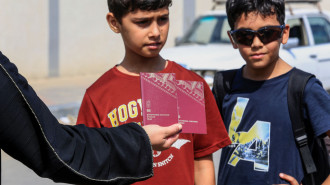Israeli 'siege tactics' block aid groups to access Gaza: NGOs
Access to war-torn Gaza has become increasingly difficult for humanitarian groups, 13 leading NGOs warned on Monday, accusing Israel's military of blocking much-needed aid from reaching the besieged Palestinian territory.
Denouncing "Israel's systematic obstruction of aid and its ongoing attacks on aid operations", the humanitarian organisations said that Israel had facilitated only 53 -- less than half -- of the 115 relief missions they had planned.
The aid groups slammed what it called Israel's "siege tactics" in its struggle against Palestinian militant group Hamas.
It said the so-called "humanitarian zone" where most of the strip's population of 2.4 million people now reside had become "an active combat zone" and "extremely unsafe".
The charities also criticised the bombing of United Nations schools used as shelters by displaced Palestinians.
At least six schools have been hit over the past nine days.
"These recent events are exacerbating the humanitarian catastrophe at a time when NGOs continue to come up against the obstacles imposed by the continuation of Israeli military operations on the ground," a press release summarising the 13 NGOs' views warned.
Oxfam, Doctors Without Borders, Save the Children and the Norwegian Refugee Council were among the charities to contribute to the document.
Since Israel began its ground offensive in the far-southern city of Rafah in May, humanitarian workers have faced major difficulties in delivering aid to the Gaza Strip's south.
Israel's capture at the beginning of May of the Rafah crossing, which has since been destroyed, brought aid deliveries to a "complete halt", the NGOs added.
Tonnes of "absolutely necessary aid" were left blocked at the crossing points in the south "due to the deterioration in security conditions", the statement said.
More than 1,500 trucks of humanitarian aid containing medicines, first-aid kits and basic necessities were stuck in the Egyptian city of Al-Arish as a result.
Meanwhile, in the north of the Gaza Strip -- which has been isolated from the south by the Israeli army -- aid delivery is "very limited".
Oxfam said it took it five weeks to transport just 1,600 food parcels from Jordan to Gaza -- a journey it said "should take no more than six hours".
At Kerem Shalom, designated since May as a priority crossing point for humanitarian aid, the situation had "deteriorated significantly since Israel's offensive in May", the aid groups said.
This had made the crossing "unsafe to access from within Gaza and currently not logistically viable".
Israel denies any famine in Gaza and accuses the United Nations of blocking aid deliveries.
"Yesterday, 211 trucks entered Gaza via Kerem Shalom," Israeli government spokesman David Mencer said on Monday.
In addition, "eight trucks were collected on the Gaza side" of the Erez along with "103 from the Gaza side of Kerem Shalom", he added.
The war began with Hamas's October 7 attack, which resulted in the deaths of 1,195 people, mostly civilians, according to an AFP tally based on Israeli figures.
The militants seized 251 hostages, 116 of whom remain in Gaza including 42 the military says are dead.
Israel responded with a military offensive that has killed at least 38,664 people in Gaza, also mostly civilians, according to data provided by the Gaza health ministry.




 Follow the Middle East's top stories in English at The New Arab on Google News
Follow the Middle East's top stories in English at The New Arab on Google News


![The US vetoed a UN Security Council (UNSC) resolution demanding a ceasefire in Gaza [Getty]](/sites/default/files/styles/image_330x185/public/2185152251.jpeg?h=7ef8ac04&itok=RpLSj2pu)